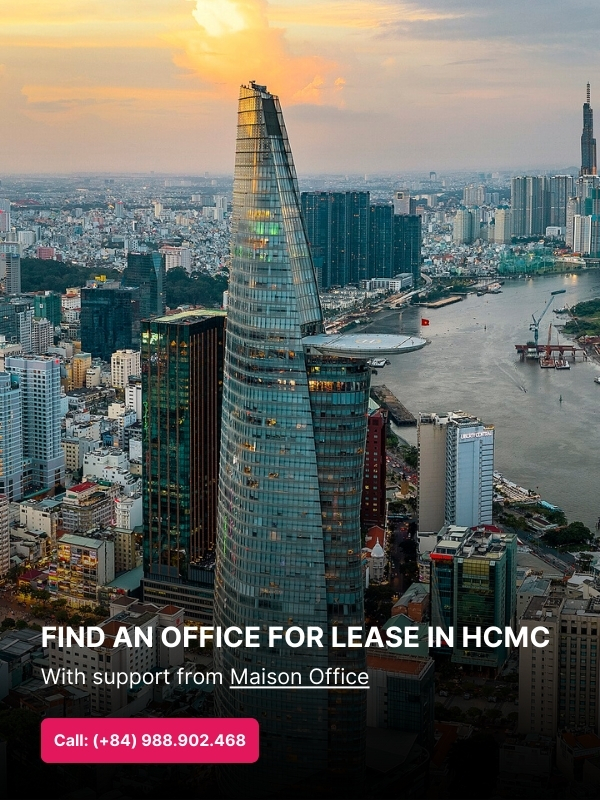Business Registration Certificates in Vietnam: Required & Costs

When establishing a business in Vietnam, obtaining a business registration certificate in Vietnam is a crucial step to ensure legal compliance. This article explores the essential requirements and costs associated with the certificate of business registration in Vietnam, providing foreign investors with a clear understanding of the process.
For a full incorporation roadmap, see How to Set Up a Company in Vietnam and understand the key milestones from IRC to ERC.
 |
 |
Table of Contents
- What is a Business Registration Certificate (ERC) in Vietnam?
- Step-by-step process to obtain the business registration certificate
- Required documents for ERC application
- How long does it take and how much does it cost?
- Find your ideal office after receiving your ERC with Maison Office
- FAQs – Business registration certificate in Vietnam
What is a Business Registration Certificate (ERC) in Vietnam?
The Business Registration Certificate, or Enterprise Registration Certificate (ERC), is issued by the Department of Planning and Investment (DPI) to certify a company’s legal establishment and operational rights in Vietnam. It functions as the Vietnamese equivalent of a Certificate of Incorporation, required for both local companies and FDIs.

Key functions of the ERC
- Provides a unique business registration code, which also functions as the company’s tax identification number.
- Confirms the company’s legal name, charter capital, head office address, and legal representative.
- Acts as the official proof of legal status of the company for banks, government authorities, and business partners.
Importance for foreign investors
For foreign investors looking to establish a presence in Vietnam, obtaining the ERC is a critical legal milestone. It is issued only after the Investment Registration Certificate (IRC) is approved—another key requirement for foreign-owned companies.

Once the ERC is granted, the company is officially recognized and can proceed to:
- Open a corporate bank account
- Sign office lease contracts
- Hire employees
- Issue tax invoices and conduct business legally
If you’re planning to apply for the ERC, you must secure a registered office address beforehand. This is where Maison Office plays a key role – by helping foreign investors lease compliant office spaces in major Vietnamese cities, ensuring your ERC application meets legal requirements.
Step-by-step process to obtain the business registration certificate
Foreign investors must follow a two-step legal process to establish a company in Vietnam. The first step involves obtaining an Investment Registration Certificate (IRC), followed by the application for an Enterprise Registration Certificate (ERC). Both are essential for setting up a fully legal foreign-owned company in Vietnam.

Step 1 – Obtain the Investment Registration Certificate (IRC)
The Investment Registration Certificate (IRC) is a mandatory license issued by the Department of Planning and Investment (DPI) that approves the investor’s business project in Vietnam. It grants permission to invest in specific sectors and outlines the scope and terms of the investment.
All foreign investors holding as little as 1% equity in a company are required to obtain an Investment Registration Certificate (IRC) before registering their business in Vietnam. This certificate is issued by the Department of Planning and Investment (DPI) at the provincial level – such as in Hanoi or Ho Chi Minh City – and is governed by the Law on Investment 2020 (No. 61/2020/QH14) along with its implementing decrees.
The processing time for an IRC is typically 15 to 20 working days, provided that the application includes complete and accurate documents and the registered office address complies with legal requirements.
Below are the documents required for IRC application:
| Documents | Notes |
| Investor’s passport or company registration | Notarized copies, translated into Vietnamese |
| Investment proposal (business plan) | Must include capital, sector, office location, and revenue projections |
| Office lease agreement | Required; must match registered business location |
| Bank statement or financial proof | Demonstrates investor’s financial capacity |
| Legal representative authorization (PoA) | If applying through a third-party consultant |
For legal background, see the Legal Framework for Foreign Investment in Vietnam
Step 2 – Prepare company registration documents
Once the Investment Registration Certificate (IRC) has been issued, the next step is to prepare the required documents to apply for the Enterprise Registration Certificate (ERC). This stage formalizes the company’s legal identity and is essential to begin business operations in Vietnam.
To ensure a smooth application, foreign investors should prepare the following:
| Documents | Description / Notes |
| Application for enterprise registration | Standard government form issued by the DPI |
| Company charter | Must be signed by founding members; outlines structure, capital, governance |
| List of shareholders or members | Required for LLCs and JSCs; must match legal IDs and share capital contributions |
| Legal ID of investors | Passport (individual) or Certificate of Incorporation + Legal Rep. ID (entity) |
| Lease agreement for registered office | Must be a valid commercial lease; address must match declared head office |
| Power of attorney (if applicable) | Required if application is submitted via a legal consultant or authorized representative |
| Translated & legalized documents | Foreign documents must be translated into Vietnamese and notarized or legalized |
Most investors complete document preparation within 5–7 working days, assuming translation and notarization are handled efficiently. Delays often arise due to:
- Mismatched office lease address vs. declared location
- Incomplete personal/legal identification of shareholders
- Missing apostille or legalization of foreign documents
In practice, many foreign investors overlook the importance of a compliant lease. According to Maison Office’s experience, over 60% of ERC delays stem from using home-based or non-commercial addresses. Our office consultants help mitigate this by offering verified, ready-to-use office spaces that meet registration standards.
Delays in notarization or legalization are common. Learn how to manage these in Vietnam Police Check: How to Get a Criminal Record Certificate
Step 3 – Submit ERC application to the Department of Planning and Investment (DPI)
Once all required documents are prepared, the application for the Enterprise Registration Certificate (ERC) must be submitted to the Department of Planning and Investment (DPI) in the province where the business is registered. This step formally initiates the company’s legal establishment in Vietnam.

Applications are typically submitted via the National Business Registration Portal, though in some cases—particularly for foreign-owned entities – physical submission of the dossier may also be required, depending on local DPI regulations.
The DPI will evaluate the application based on legal consistency, completeness of the documents, accuracy of the registered address, and compliance with investment laws. The standard processing time is three (03) working days, provided that the file is complete and valid. However, delays may occur due to issues such as:
- Non-compliant or shared-use addresses in the office lease
- Missing or improperly legalized foreign documents
- Mismatches between online and physical application versions
- Inconsistencies in capital contribution or legal representative declarations
It is strongly advised to ensure that the office lease agreement submitted aligns exactly with the registered business location, as this is one of the most common grounds for ERC rejection. Once the ERC is granted, the company is legally recognized as a business entity in Vietnam and may proceed with essential post-licensing activities.
Step 4 – Receive ERC within 3 working days
Once the application is submitted and accepted by the Department of Planning and Investment (DPI), the Enterprise Registration Certificate (ERC) is typically issued within three (03) working days, assuming the dossier is complete, accurate, and compliant with all legal requirements. The ERC will be delivered either in digital format via the National Business Registration Portal or as a physical hard copy, depending on local practices. This certificate serves as the foundation for all subsequent business operations and legal obligations.

However, issues often arise that can delay issuance including:
- Use of a non-compliant or previously registered business address
- Missing or incorrectly legalized foreign documents
- Discrepancies in the declared ownership structure or capital contribution
- Inconsistencies between online and hard copy submissions
Based on Maison Office’s experience supporting over 300 foreign-invested enterprises in Vietnam, the vast majority of ERCs are issued within three working days when the application is properly prepared and accompanied by a compliant office lease. However, nearly 40% of delays encountered by new FDI clients were due to the use of residential or co-working addresses that did not meet the legal criteria set by the Department of Planning and Investment. So it is crucial to ensure that the registered office address stated in the ERC matches a legally leased, commercial office space.
Required documents for ERC application
Company charter and application form
The two foundational documents required for applying for an Enterprise Registration Certificate (ERC) in Vietnam are the company charter and the application form for enterprise registration. These documents establish the company’s legal structure and operational framework under Vietnamese law and must be prepared with precision, particularly in cases involving foreign investors.

| Criteria | Application form for enterprise registration | Company charter |
| Purpose | Declares official business details to the government | Outlines internal governance and operational structure of the company |
| Issuing format | Standardized form issued by the Department of Planning and Investment (DPI) | Custom document drafted by the company or legal counsel |
| Key contents | Company name, legal rep., address, capital, business lines, company type | Capital contribution structure, rights of members/shareholders, decision-making procedures |
| Language requirement | Must be in Vietnamese | Must be in Vietnamese; foreign charters must be translated and notarized |
| Signatories | Legal representative | Founding members or shareholders |
| Submission format | Digital submission via National Business Registration Portal; physical copy may be required | Included in full ERC application dossier (digital + hard copy depending on DPI) |
| Legal reference | Regulated under Law on Enterprises (Form No. I.3 or equivalent per Decree 01/2021/NĐ-CP) | Must comply with the Law on Enterprises 2020 and align with content in the Investment Registration Certificate (IRC) |
| Common issues | Mismatch with lease address, incorrect business lines | Missing dispute resolution clauses, undefined management roles, inconsistency with investor structure |
| Approval dependency | Must be 100% accurate to avoid rejection or delays | Must align with other documents and reflect ownership/shareholder control accurately |
Legal documents of investor(s)
A critical component of the ERC application dossier is the provision of valid and properly authenticated legal documents from all contributing investors – whether they are foreign individuals or corporate entities. These documents serve to verify the legal identity, nationality, and financial capability of the investor(s), as required under the Law on Enterprises 2020 and Decree 01/2021/NĐ-CP.
| Criteria | Individual foreign investor | Foreign corporate investor |
| Primary ID document | Passport | Certificate of Incorporation / Business Registration Certificate |
| Legalization requirement | No consular legalization required (for passport) | Must be consular legalized or apostilled before translation and notarization |
| Translation & notarization | Required (passport must be translated into Vietnamese and notarized) | Required for all foreign-issued documents |
| Additional document | Proof of residential address (optional but recommended) | Corporate resolution authorizing investment; must specify legal rep. & contribution |
| Authorized representative | N/A (investor acts on their own behalf) | Required: Passport/ID of legal rep. + authorization in writing |
| Document validity window | Typically valid for 6 months from notarization | Same; validity often based on date of legalization or notarization |
| Common issues | Incorrect translation, expired passport | Missing apostille/legalization, mismatch in corporate name or address |
However, please note the following important notes:
- All foreign-issued documents must be legally authenticated, then translated and notarized in Vietnam. Failure to complete these steps is a leading cause of ERC application rejection.
- Ensure consistency of investor names and addresses across all documents to prevent administrative delays.
- Documents are usually valid for 3–6 months from the date of notarization or legalization for the purpose of company registration.
Lease agreement for the company’s head office
A legally valid lease agreement for the company’s registered office is one of the most critical documents in the Enterprise Registration Certificate (ERC) application. Under Vietnamese law, all enterprises must declare a physical business address that complies with zoning and commercial usage regulations. This address must match the location stated in the ERC and must be backed by a commercial lease agreement, not a residential or shared-use space.

Key requirements for the lease agreement
- Commercial-use property: The office must be located in a legally zoned building approved for business activities. Residential or virtual offices are not accepted.
- Accurate details: The lease must clearly state the tenant’s legal name, full address, lease duration, and landlord information.
- Minimum term: While not legally fixed, a lease term of at least 6–12 months is recommended to meet DPI expectations.
- Supporting documents: Some DPIs may request additional documentation such as the building’s land use right certificate or the landlord’s business license.
Investors can refer to the table of Acceptable and Non-acceptable lease contract types for ERC registration below to avoid making mistakes that lead to the contract being rejected.
| Criteria | Acceptable lease types | Non-acceptable lease types |
| Zoning/Usage approval | Office buildings or commercial-use properties | Residential apartments, serviced apartments, or buildings not zoned for office use |
| Lease format | Formal written lease contract with landlord signature and tax code | Informal agreements, verbal arrangements, or hand-written notes |
| Registered address | Full, verifiable business address (with ward, district, and building name) | Shared office addresses not assigned to the specific company |
| Supporting documents | Often includes land use right certificate, fire safety docs (if requested) | No supporting building ownership or licensing documentation |
| Lease term | Typically 6–12 months or longer | Temporary/short-term leases under 3 months |
| Use in government filing | Fully accepted by DPI for ERC and IRC registration | Often rejected or flagged by DPI for inconsistency or non-compliance |
Power of attorney (if applicable)
In cases where the business owner or foreign investor does not directly submit the ERC application, a Power of Attorney (PoA) is required to authorize a third party – typically a legal consultant, service provider, or company representative – to act on their behalf. The PoA ensures that the appointed individual or entity has legal authority to sign and file documents during the registration process in accordance with Vietnamese law.
A power of attorney needs certain requirements to be legally valid, here are those requirements:
| Requirement | Details |
| Scope of authorization | Must clearly state permitted actions (e.g., sign documents, submit ERC application) |
| Parties involved | Full legal names, nationalities, and ID/passport numbers of both principal and authorized person |
| Notarization (Domestic) | If issued in Vietnam, must be notarized by a licensed notary office |
| Legalization (Overseas) | If issued abroad, must be consular legalized or apostilled, then translated and notarized in Vietnam |
| Language | Must be in Vietnamese or officially translated into Vietnamese |
| Validity period | Should include effective date and expiration or scope-limited timeframe |
In one case, an investor from France submitted a PoA without notarization, leading to DPI rejection and requiring resubmission through a consular-legalized version—delaying the ERC process by 7 working days. To prevent such delays, foreign investors are strongly advised to prepare and legalize the PoA concurrently with other foundational documents.
Many foreign investors engage experts to support the process. See Company Registration in Vietnam: Step-by-Step Guide 2025.
How long does it take and how much does it cost?
The process is generally straightforward, but it can vary depending on the completeness of your documentation and the complexity of your company structure. Below, we outline the typical registration timeline and associated costs to help you plan effectively for your company’s establishment in Vietnam.

Typical registration timeline
The process of obtaining the Enterprise Registration Certificate (ERC) in Vietnam typically follows a clear timeline, provided that all required documents are complete and compliant with local regulations. Below is a breakdown of the standard timeline for the ERC application process, from submission to approval:
| Stage | Duration | Details |
| Step 1: Submit the ERC application | 1-2 working days | After preparing and verifying all documents, the application is submitted to the Department of Planning and Investment (DPI) through the National Business Registration Portal |
| Step 2: Review by DPI | 3 working days | The DPI reviews the submitted application. Any inconsistencies or missing documents will result in delays |
| Step 3: Receive the ERC | 3 working days | After approval, the ERC is issued either digitally or as a physical document, confirming the company’s legal establishment in Vietnam |
| Total duration | 7-10 working days | Assuming all documentation is complete and accurate, the entire process usually takes around 7-10 working days. Delays may occur due to document issues or discrepancies |
While the standard process can be completed in about 7 to 10 working days, several factors can impact the timeline, including:
- Incomplete documentation: Missing or incorrect forms, such as the company charter or investor identification, may delay the process.
- Address-related issues: Discrepancies between the registered office lease address and the actual address listed on the documents can result in rejection or resubmission requests from DPI.
- Additional review: In some cases, DPI may request extra verification or clarification for foreign investors, particularly those from high-risk jurisdictions.
Government fees and notarization costs
When registering a business in Vietnam and applying for the Enterprise Registration Certificate (ERC), there are several government fees and notarization costs that foreign investors must anticipate. These costs can vary depending on the scale and nature of the business, as well as the location of registration.

Here is a comparison table summarizing the key government fees and notarization costs involved in the Enterprise Registration Certificate (ERC) application process:
| Fee type | Cost range | Description |
| Enterprise registration fee | VND 200,000 to 1,000,000 (USD 10-40) | The fee for submitting the ERC application, varying by business type and location |
| Tax registration fee | Included in ERC application fee | Nominal fee for obtaining a tax code after receiving the ERC |
| Notarization fees | VND 50,000 to 150,000 (USD 2-6) | Cost for notarizing legal documents within Vietnam |
| Consular legalization fees | USD 30 to 80 per document | Costs for consular legalization of documents from abroad (varies by embassy) |
| Special permits (if applicable) | VND 500,000 to several million VND | Fees for licenses or permits for regulated industries like healthcare or finance |
Besides, certain business sectors (e.g., healthcare, education, finance) may require additional permits or licenses, which can incur additional fees. These fees can vary widely, ranging from VND 500,000 to several million VND depending on the regulatory requirements of the specific industry.
For additional cost planning, review Vietnam Company Tax Rate: Corporate Tax, VAT, Incentives
Optional: Legal service fees
While the Enterprise Registration Certificate (ERC) process can be done independently, many foreign investors choose to engage legal services to ensure their application is accurate, compliant, and processed efficiently. Legal consultants can assist with document preparation, notarization, and submission, providing peace of mind for businesses unfamiliar with Vietnamese laws and administrative procedures.

Typical legal service fees
Legal service fees can vary depending on the complexity of the business, the legal firm’s reputation, and the specific services provided. Generally, the fees range from:
- Standard legal consultation: Between USD 200 to 500 for initial advice and guidance on company formation and document requirements.
- Full service for ERC application: A comprehensive package that includes document preparation, notarization, submission, and communication with the DPI may range from USD 1,000 to 3,000, depending on the complexity of the registration.
- Ongoing legal support: If additional legal services are needed, such as obtaining licenses, handling disputes, or company restructuring, fees may increase and vary based on the scope of work.
Legal services typically include
- Company registration consultation: Guidance on choosing the right business entity (LLC, JSC) and structuring ownership.
- Document preparation and review: Assistance with preparing the company charter, PoA, office lease agreements, and tax-related documents.
- Notarization and legalization: Coordination of notarization, consular legalization, and translation of foreign documents.
- Application submission: Filing all necessary forms and documents with the Department of Planning and Investment (DPI) and following up on the status of the application.
- Post-registration services: Legal support for tax registration, business licenses, and labor contracts post-ERC approval.
Investors should work with a reputable legal service provider to ensure registration goes smoothly and promptly, especially for foreign businesses unfamiliar with Vietnam’s regulations.
Find your ideal office after receiving your ERC with Maison Office
After your Enterprise Registration Certificate (ERC) is issued, the next essential step is securing a legally compliant office address—required for tax registration, licensing, and official operations.
Maison Office, your reliable commercial leasing agent in Vietnam, helps foreign investors find verified office spaces in Ho Chi Minh City, Hanoi that meet Department of Planning and Investment (DPI) standards.
We offer fully furnished, ready-to-use spaces in central business districts, with flexible lease terms to support your post-ERC needs—whether you’re launching or scaling your operations.
FAQs – Business registration certificate in Vietnam
To help clarify common questions about the business registration process in Vietnam, we’ve answered some of the most frequently asked queries regarding the Investment Registration Certificate (IRC), Enterprise Registration Certificate (ERC), and related procedures.
Do I need both an IRC and an ERC?
Yes, both an Investment Registration Certificate (IRC) and an Enterprise Registration Certificate (ERC) are required to establish a business in Vietnam. The IRC grants foreign investors permission to invest in a particular sector and sets the framework for their investment. Once the IRC is obtained, the ERC is then issued to legally recognize the business entity and authorize its commercial operations. The IRC is the first step, while the ERC finalizes the registration and allows you to begin business activities.
Can a foreigner be the legal representative?
Yes, a foreigner can be the legal representative of a company in Vietnam. However, there are specific requirements based on the business entity type. For a 100% foreign-owned enterprise, the legal representative can be a foreign individual. The legal representative must be a Vietnamese resident for certain procedures (such as tax registration), but a foreign national can still hold the title if authorized. It’s important to check the regulations for specific sectors, as some may require a Vietnamese national as the legal representative.
How long is the ERC valid for?
The Enterprise Registration Certificate (ERC) is valid indefinitely as long as the company remains in operation and complies with Vietnamese laws. However, any changes to the company—such as a change in address, ownership structure, or business activities—must be updated with the Department of Planning and Investment (DPI), and a new ERC may need to be issued. Regular maintenance, such as tax filings and annual reports, is also required to keep the ERC valid.
Can I change the address after registration?
Yes, you can change the registered office address after receiving the ERC. However, any change in the company’s registered address must be formally updated with the Department of Planning and Investment (DPI). A new lease agreement will be required for the new office address, and the change must be reflected in the company’s official records. Failure to update the address properly may lead to legal complications or delays in business operations.
Understanding the necessary requirements and costs involved in the certificate of business registration in Vietnam can help streamline the process and ensure compliance with local regulations. With the right guidance, securing your Vietnam business registration certificate will pave the way for successful business operations in Vietnam.




